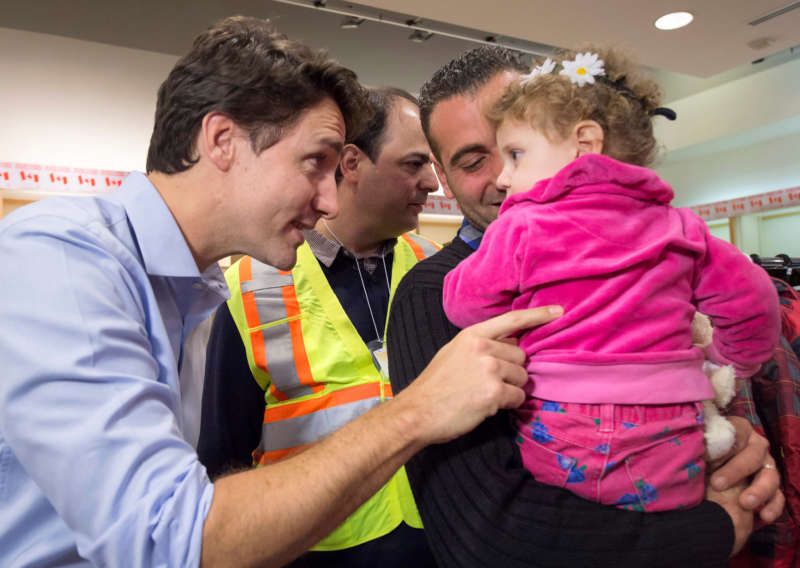
The term “Canadian values” is normally a harmless cliché — a reminder that the planet’s second largest country by land mass is a Boy Scout-like bastion of tolerance and fairness. This trope regained some of its luster with last fall’s election of Prime Minister Justin Trudeau, who might as well be the country’s Boy Scout in chief.
“We’re Canadian, and we’re here to help,” the youthful 44-year-old said in an address to the United Nations General Assembly recently.
Were it up to Kellie Leitch, Canadian values would take a distinctly different turn. Ms. Leitch, a member of Parliament and one of seven registered candidates for leader of the Conservative Party, wants to screen immigrants for what she calls “anti-Canadian values.”
Ms. Leitch has intimated that would-be immigrants who are against “hard work,” “generosity” and (yes) “tolerance” shouldn’t be allowed entry into the country.
“Right now, we screen people for security reasons. You know we ask individuals what their income is. So why would we not ask some simple questions with regards to whether you believe in equality of rights?” she told the CBC.
The other leadership candidates were quick to condemn Ms. Leitch, including Deepak Obhrai, a Tanzanian émigré who has been a member of Parliament for 20 years. “You make us feel unwelcome,” Mr. Obhrai said of her on CBC Radio.
Yet Ms. Leitch’s gambit has struck a chord with the public. An Angus Reid poll in October suggested 67 percent of Canadians feel “minorities should do more to fit in better with mainstream Canadian society.”
Perhaps Canadians aren’t quite so Canadian as the cliché suggests.
But from its beginnings, Canada has taken an attitude toward immigration that was born of both necessity and idealism; the country needed more able bodies for its work force than the traditional stream of old-stock Europeans could provide.
German, Scots and Irish immigrants supplanted their French brethren following the end of the Seven Years War in 1763. Later and more reluctantly, the country took in Ukranians, Poles, Italians, Greeks, Jews, Syrians, Asians and blacks from the Caribbean. It’s a big country to fill.
Canada’s modern-day love affair with immigration began in 1971, when the country, under Justin Trudeau’s father, Pierre, became the first in the world to adopt multiculturalism as official policy. But despite Canada’s reputation as a welcoming harbor for immigrants and refugees, the issue has always divided Canadians themselves, mainly on economic grounds, according to polls.
In 1979, for example, the right wing think tank National Citizens Coalition reacted to Canada’s acceptance of 50,000 Vietnamese refugees by predicting it would lead to “at least 750,000 in the not too distant future.”
Today, there are roughly 190,000 Vietnamese in Canada, according to the most recent census numbers. The integration of Vietnamese refugees into Canadian society has served as a blueprint for the country’s welcoming of 31,000 Syrian refugees. (The United States, which is nearly nine times the size of Canada’s population, has pledged to take in only 10,000.)
The most recent obstacle has been terrorism on home soil. In 2014, in the space of two days, two members of the Canadian military were killed by Islamic terrorists in separate attacks in the military town of St.-Jean-Sur-Richelieu and on Ottawa’s Parliament Hill.
That the perpetrators were self-radicalized Canadian-born men was seemingly immaterial, as fear trumped common sense. The arrival of Syrian refugees has only increased that fear.
“Stagnation and security fears have produced a closing of the Canadian mind when it comes to the three pillars of globalization: immigration, free trade and foreign direct investment,” says Frank Graves, the president of the Ottawa-based EKOS Research Associates polling firm. “We are not ‘closed,’ but we are much less open than we were at the outset of the century.”
In Quebec, immigration has always raised tensions, in large part because it is often seen as a threat to the culture of the French-speaking province. In 2013, the province of Quebec’s governing Parti Québécois introduced the “Quebec values charter,” which sought to prohibit the wearing of any “conspicuous” religious garb by the province’s public service, in the interests of state secularism.
One of its architects, Jean-François Lisée, compared it to Thomas Jefferson’s separation of church and state. Now the Parti Québécois leader, Mr. Lisée recently mused that burqas must be banned from Quebec “before a jihadist uses one to hide his movements.”
Ms. Leitch’s turn toward values has given her campaign a shot in the arm, but her own political history suggests that it’s a mug’s game. The previous Conservative government, in which Ms. Leitch was a minister, played the values card in last election — and lost, to Mr. Trudeau’s Liberals. Similarly, the Parti Québécois campaigned almost exclusively on its values charter in 2014, and suffered one of the worst defeats in party history as a result.
Long on bombast and short on details, Ms. Leitch’s Canadian values proposition has a certain Donald Trump-like whiff to it. And much like Mr. Trump’s various utterings, it might play well for a segment of her party’s base but hasn’t yet proven to be successful with the voting public at large.
Even so, that she sees dividends in exploiting Canadian values says more about that old cliché than many would care to admit. If Ms. Leitch’s campaign gains support, it would, as is the case with Mr. Trump’s candidacy, make Canadians acknowledge the level of their hostility toward the very kind of people who built the country in the first place.
Martin Patriquin is the Quebec bureau chief for Maclean’s.
